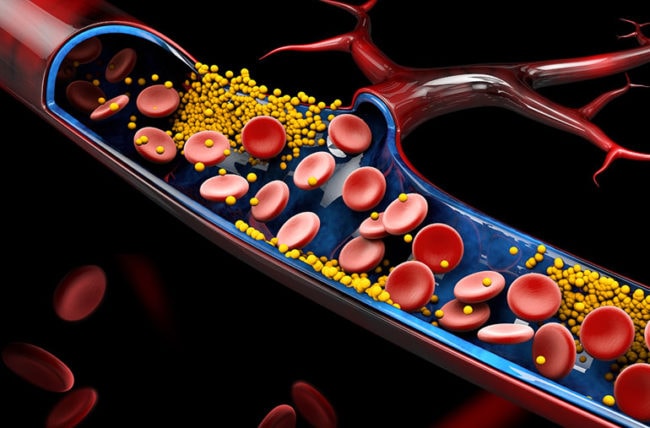What Are Statins And How Do They Lower Cholesterol Levels?

Statins are a widely prescribed class of medications used to lower cholesterol levels in individuals with hyperlipidemia.
This article aims to provide an overview of statins, including their mechanism of action, effectiveness, potential side effects, and the role of lifestyle changes in supporting statin therapy.
Cholesterol is a lipid molecule that plays a crucial role in various physiological processes but can also contribute to the development of cardiovascular disease when present in excessive amounts.
Statins work by inhibiting an enzyme involved in the production of cholesterol in the liver, thereby reducing the overall cholesterol levels in the bloodstream.
Understanding the mechanism of action and potential risks associated with statin use is vital for both healthcare providers and patients.
Additionally, lifestyle modifications such as dietary changes and regular exercise can enhance the efficacy of statin therapy.
It is important for individuals considering or currently using statins to consult with a healthcare provider to assess the appropriateness, benefits, and potential risks of statin therapy.
Key Takeaways
- Statins are medications used to lower cholesterol levels by inhibiting an enzyme involved in cholesterol production.
- They reduce LDL cholesterol levels, modestly increase HDL cholesterol levels, and lower triglyceride levels in the blood.
- Statins have been extensively studied and proven to be safe and effective in reducing cholesterol levels and preventing cardiovascular events.
- Lifestyle changes, such as consuming fiber-rich foods, incorporating omega-3 fatty acids, and regular physical activity, alongside statin therapy, can further improve cardiovascular health and reduce cholesterol levels.
Understanding Cholesterol and its Impact on Health
Cholesterol plays a crucial role in the overall health of an individual, and understanding its impact is fundamental to maintaining a healthy lifestyle. Cholesterol management is essential in preventing the development of cardiovascular diseases, as high levels of cholesterol can lead to the formation of plaques in the arteries, restricting blood flow and increasing the risk of heart attacks and strokes.
Dietary modifications are often recommended as the first line of defense in managing cholesterol levels. These modifications typically involve reducing the consumption of saturated and trans fats, which are known to raise cholesterol levels. Additionally, increasing the intake of soluble fiber, such as that found in fruits, vegetables, and whole grains, can help lower cholesterol levels.
By incorporating these dietary changes, individuals can effectively manage their cholesterol levels and reduce the risk of cardiovascular diseases.
The Role of Statins in Lowering Cholesterol
Dyslipidemia, a common condition characterized by abnormal lipid levels in the blood, necessitates the exploration of therapeutic interventions that can effectively modulate lipid profiles.
Statins, a class of drugs widely used for cholesterol management, play a crucial role in lowering cholesterol levels. They primarily function by inhibiting an enzyme called HMG-CoA reductase, which is responsible for cholesterol synthesis in the liver. By blocking this enzyme, statins reduce the production of cholesterol and increase the number of low-density lipoprotein (LDL) receptors on liver cells. This results in enhanced clearance of LDL cholesterol from the bloodstream, leading to decreased LDL cholesterol levels.
Moreover, statins also have additional cardioprotective effects, including reducing inflammation and stabilizing plaques in the arteries.
Overall, statin therapy has a significant impact on improving lipid profiles and reducing the risk of cardiovascular diseases.
Mechanism of Action of Statins
This discussion will focus on the mechanism of action of statins, specifically their role in blocking the enzyme HMG-CoA reductase and stimulating LDL receptor expression.
Statins work by inhibiting HMG-CoA reductase, the key enzyme involved in cholesterol synthesis. By blocking this enzyme, statins reduce the production of cholesterol in the liver.
Additionally, statins have been shown to increase the expression of LDL receptors on the surface of liver cells, which promotes the clearance of LDL cholesterol from the bloodstream.
Blocking the Enzyme HMG-CoA Reductase
Blocking the enzyme HMG-CoA reductase inhibits the production of cholesterol in the liver, thereby reducing its levels in the blood. This enzyme is responsible for catalyzing the conversion of HMG-CoA to mevalonate, a precursor in cholesterol synthesis. By inhibiting HMG-CoA reductase, statins effectively limit the availability of mevalonate, disrupting the synthesis of cholesterol.
This mechanism of action has several implications:
- Enzyme inhibition: Statins act as competitive inhibitors of HMG-CoA reductase, binding to its active site and preventing the conversion of HMG-CoA to mevalonate.
- Cholesterol synthesis: By blocking HMG-CoA reductase, statins reduce the production of cholesterol in the liver. This leads to a decrease in the levels of LDL cholesterol, commonly referred to as ‘bad cholesterol.’
- Upregulation of LDL receptors: In response to reduced cholesterol levels, cells upregulate the expression of LDL receptors. This increases the uptake of LDL cholesterol from the bloodstream, further contributing to the overall reduction in cholesterol levels.
Overall, blocking HMG-CoA reductase is a key mechanism by which statins lower cholesterol levels, making them a commonly prescribed medication for managing hypercholesterolemia.
Stimulating LDL Receptor Expression
Increased expression of LDL receptors plays a crucial role in the regulation of cholesterol homeostasis and is an important target for therapeutic interventions in hypercholesterolemia. LDL receptors are responsible for the uptake of LDL cholesterol from the bloodstream into cells. Statins, a class of drugs commonly used to lower cholesterol levels, have been found to stimulate LDL receptor expression. This mechanism involves the inhibition of the enzyme HMG-CoA reductase, which leads to reduced intracellular cholesterol levels. As a result, the cell compensates by upregulating LDL receptor expression to increase cholesterol uptake. This feedback loop helps to decrease circulating LDL cholesterol levels and improve cholesterol regulation.
To further understand the impact of LDL receptor function on cholesterol regulation, let’s take a look at the following table:
| LDL Receptor Function | Effect on Cholesterol Regulation |
|---|---|
| Increased | Enhances cholesterol uptake |
| Decreased | Reduces cholesterol clearance |
| Dysfunctional | Impairs cholesterol metabolism |
| Normal | Maintains cholesterol balance |
By stimulating LDL receptor expression, statins effectively enhance cholesterol uptake, contributing to the overall reduction in cholesterol levels. This mechanism highlights the significance of targeting LDL receptor function in the treatment of hypercholesterolemia.
Types of Statins and their Effectiveness
One class of cholesterol-lowering medications, known as statins, demonstrates varying degrees of efficacy depending on the specific type administered. Statins are a group of drugs that inhibit the enzyme HMG-CoA reductase, which plays a vital role in cholesterol synthesis in the liver.
Different types of statins vary in their chemical structure and potency, leading to differences in their effectiveness in lowering cholesterol levels. Some commonly prescribed statins include atorvastatin, simvastatin, rosuvastatin, pravastatin, and lovastatin.
The effectiveness of statins in reducing cholesterol levels also depends on the dosage administered. Higher doses of statins tend to result in greater reductions in LDL cholesterol levels. However, the appropriate dosage of statins should be determined by healthcare professionals based on individual patient characteristics and risk factors.
Potential Side Effects and Risks of Statin Use
The use of statins has been associated with potential side effects and risks that should be considered by healthcare professionals when prescribing them.
While statins are generally well-tolerated, some individuals may experience adverse effects. Common side effects include muscle pain, digestive issues, and liver abnormalities. Although rare, serious side effects such as rhabdomyolysis, a condition characterized by the breakdown of muscle fibers, can occur.
Additionally, statins have been linked to an increased risk of diabetes, particularly in individuals who already have risk factors for the disease. Other potential risks associated with statin use include cognitive impairments, such as memory loss or confusion, and an increased likelihood of developing cataracts.
It is important for healthcare providers to weigh the benefits against the potential risks and closely monitor patients who are prescribed statins.
Lifestyle Changes to Support Statin Therapy
To optimize the effectiveness of statin therapy, it is crucial for individuals to implement lifestyle modifications that promote cardiovascular health. These modifications include making dietary modifications and incorporating an exercise regimen.
- Dietary modifications: A heart-healthy diet that is low in saturated and trans fats can help reduce cholesterol levels. Individuals should focus on consuming foods rich in fiber, such as whole grains, fruits, and vegetables. Additionally, incorporating omega-3 fatty acids found in fatty fish like salmon and mackerel can have a positive impact on cholesterol levels.
- Exercise regimen: Regular physical activity has been shown to increase high-density lipoprotein (HDL) cholesterol levels, also known as the ‘good’ cholesterol. Engaging in aerobic exercises, such as brisk walking, jogging, or cycling, for at least 30 minutes a day can help lower low-density lipoprotein (LDL) cholesterol levels.
By implementing these lifestyle changes alongside statin therapy, individuals can further improve their cardiovascular health and reduce their cholesterol levels.
Consultation and Monitoring with a Healthcare Provider
Consultation and monitoring with a healthcare provider is essential for ensuring the optimal management of statin therapy and cardiovascular health. Seeking consultation benefits individuals who are prescribed statins, as it allows for a thorough understanding of the medication and its potential side effects. Healthcare guidance is crucial in determining the appropriate dosage and duration of statin therapy, as well as monitoring the patient’s response to treatment.
Regular check-ups and monitoring help healthcare providers assess the effectiveness of statin therapy in lowering cholesterol levels and reducing the risk of cardiovascular events. In addition, healthcare providers can provide valuable advice on lifestyle modifications, such as dietary changes and exercise, to support the effects of statin therapy.
Overall, consultation and monitoring with a healthcare provider play a vital role in optimizing statin therapy and achieving cardiovascular health goals.
Frequently Asked Questions
Are statins the only medication available for lowering cholesterol levels?
Yes, there are alternative medications available for lowering cholesterol levels. The effectiveness of statins, the most commonly prescribed medication, has been well-documented, but other drugs such as bile acid sequestrants and PCSK9 inhibitors have also shown promise.
Can statins completely eliminate the risk of heart disease?
Statins are known for their effectiveness in reducing the risk of heart disease, but they cannot completely eliminate it. While statins lower cholesterol levels, other factors such as lifestyle choices and genetic predisposition also play a role in heart disease.
How long does it take for statins to start lowering cholesterol levels?
Statins typically begin to lower cholesterol levels within a few weeks of regular use. The effectiveness of statins in reducing cholesterol depends on factors such as dosage, individual response, and adherence to treatment.
Can statins be used during pregnancy or while breastfeeding?
The safety of statins during pregnancy is not well-established and they are generally not recommended. The effectiveness of statins while breastfeeding is also unclear. Consult a healthcare provider for individualized advice.
Are there any dietary restrictions or interactions with other medications while taking statins?
While taking statins, individuals may need to follow certain dietary restrictions to optimize their effectiveness. Additionally, it is essential to be cautious of potential drug interactions with other medications to ensure the safety and efficacy of statin therapy.









